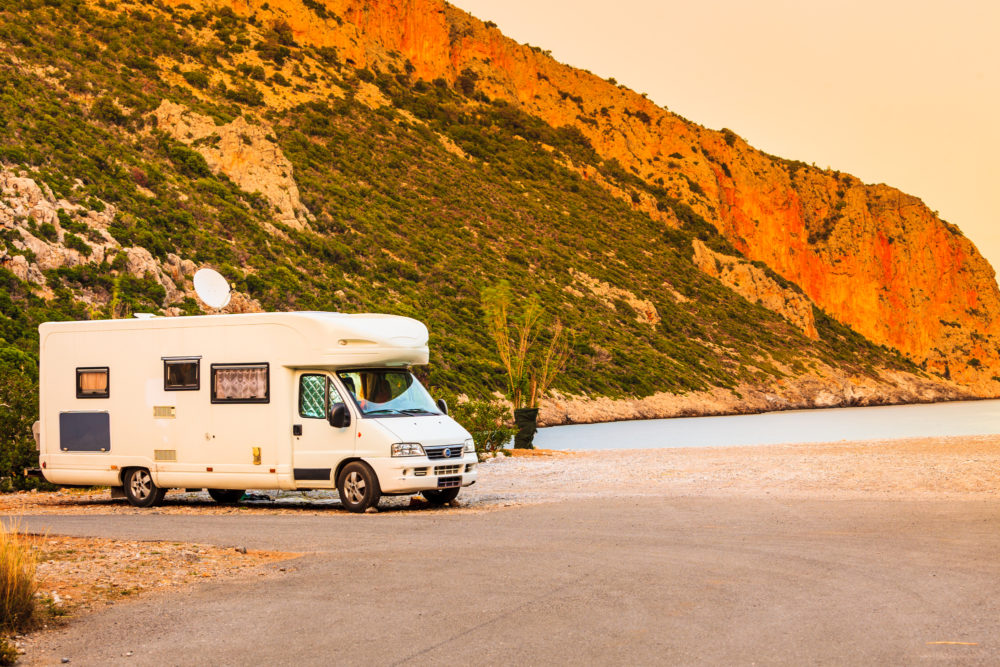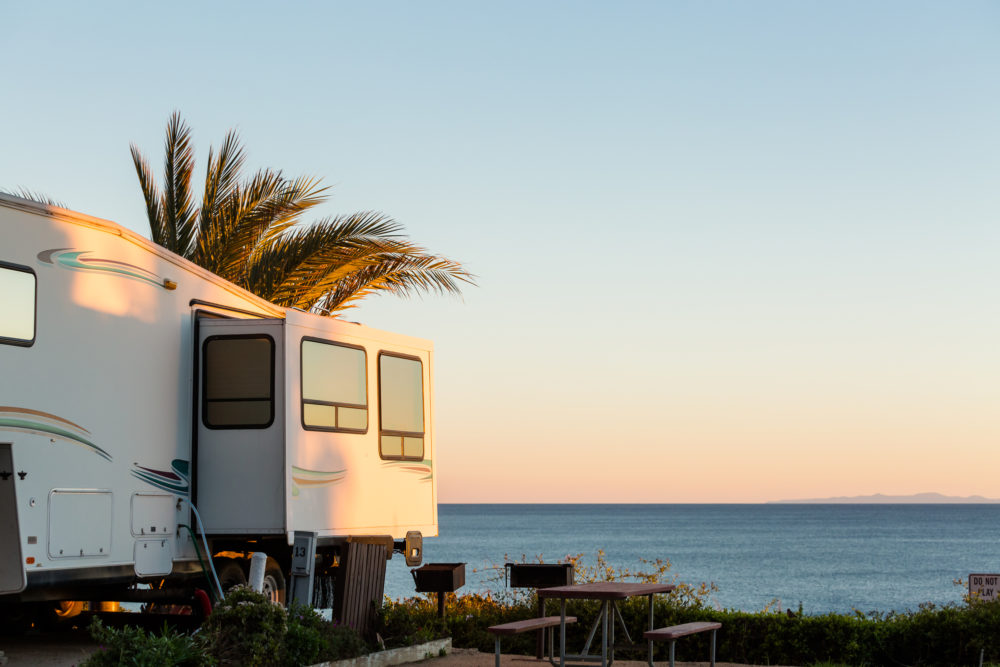How Long Can You Finance An RV?
What Are The Typical RV Loan Terms?
While it is difficult to say what constitutes a “typical” RV loan due to different situations depending on the amount of the loan, one’s financial situation, as well as the overall economic and banking situation at the time of purchase, the average RV loan length is anywhere between 10-15 years, with the interest rates anywhere from 4-8% (which is fairly high considering the duration of the loan).
RV loans that are over $50,000 usually require a collateral and can be extended up to 20 years. This is mostly to reduce the amount of monthly payment.

Contents
The RV loan is a class of its own, a hybrid between a car loan and a mortgage: the duration is equivalent to a mortgage while the interest rate mirrors the car loan industry more.
How Hard Is It To Get RV Financing?
The ability to secure financing for an RV largely depends on one’s financial situation, as well as the amount to finance. In that regard, the process is not that much different from purchasing and financing a vehicle.
However, the lenders are not as eager to finance an RV (in fact, many mainstream lenders don’t even bother offering an RV loan, while there is about a handful of lenders who offer the RV loan as a product and are selective during the approval process).
Since the RVs are a quickly depreciating asset, this is a high risk financing loan for the bank; they often require a bigger down payment to avoid “upside down” loan situations, where the customer owes significantly more than the RV is worth. Since the RV is the collateral and its value depreciates fast, the lender wants this gap to be as small as possible.
It is not unusual to have the RV drop 20% in value within the first year (although the market has been somewhat favorable with regard to RVs holding value due to fewer units being built/manufacturing delays and shortages).
It should not cost you anything to get RV financing; if there are application fees etc., consider going elsewhere. The lender makes money off the interest you pay on the loan for the duration of the loan; that should be the only “cost” to you for borrowing money.
During the purchasing process, make sure you really read the contract/purchase agreement and see the total breakdown of all fees etc. before you sign on the dotted line. Do not sign if you are not sure or do not understand something. Do not sign if the dealer does not want to address your concerns or refuses to answer your question.
The contract/purchase agreement should have your RV’s VIN number, which means that the contract is for the purchase of a specific unit that becomes yours upon signing and delivery. The dealer cannot sell this same unit to someone else and he cannot continue to show your unit once the contract is signed.
This is mainly for liability reasons, as well as to protect your unit from any damage after you sign the contract. The dealer also cannot swap the unit after the contract is signed.
How To Qualify For An RV Loan
The RV loan pre-qualification is much like most loan applications: the lender will pull a hard credit inquiry, along with your recent credit score, to determine their risk of lending you the money. After that, they will let you know which terms they are willing to offer you with regard to duration, interest rate and total amount they are willing to lend you.
If the loan amount is less than what the purchase price is, you can either re-negotiate the price, find a different unit or pay for the loan amount shortage with cash or via other loan means (e.g. family etc.).
Sometimes, a lender will ask for pay stubs for the last 2 years, or want to know whether you own your home so they can use it as collateral in case you default on your RV loan. Overall, the lender is trying to bring their default risk down as low as possible.
What Is The Longest Term To Finance An RV?
The longest RV length loan is 15 years or 180 months and it is offered by US Bank or Mountain America Credit Union. In rare cases, one can get a 20-year loan with a $50,000 collateral (or house as collateral). This would be for high-end Class A models that can easily sell for $300,000+.
Factors That Affect How Long You Can Finance A RV
There are several different factors that affect the terms of RV financing:
- Type of RV (Size, Class)-this determines the amount financed
- Age of RV (New vs. Used)-many lenders finance only new RVs
- Type of Loan (Secured vs. Unsecured)-unsecured loans are near impossible to get
- Current interest rates-longer terms often have a higher interest rate
- Average monthly payment
- Where you can get a loan (e.g. banks, credit unions, RV shows, RV dealers)
- Credit score (minimum 660+, very few lenders will finance people with lower FICO score).
Often, the lenders partner with RV dealers at RV shows to offer special financing when an RV is purchased during the show. Credit unions are also a great option for competitive rates and good financing solutions for their members.
How To Use An RV Loan Calculator
There are several online RV calculators that you can use to get an idea of how much you would have to pay on a RV loan monthly, how much you can afford and what the total loan repayment amount with interest would be. Keep in mind that the online calculators are not 100% accurate and often do not include additional fees you will incur as part of the original purchase.
Below is a link to one of the online RV loan calculators: www.mortgagecalculator.org
You input the purchase price, the loan term and the interest rate, as well as any down payment, rebates or trade-in allowance. This particular RV loan calculator even shows the sales tax percentage, along with the monthly payment, total interest and total repayment amount.

Tips On How To Get The Better Rates On RV Loans
If you are getting serious about purchasing an RV, know your budget and stick with it. Do not purchase and finance anything for at least six months to avoid a hard inquiry on your credit (it brings your FICO score down). Caution: some cell phone providers and some utilities also pull a hard credit.
Do not over-extend your budget just because you “fell in love” with a specific model. Have a list of key non-negotiable features and look for those in RVs that are in your price range. Make sure you have money left-over for travel with your new RV!
Do not purchase an RV impulsively, as this could be a really expensive buyer’s remorse. Most dealers have a 72-hr rescind period, after which your down-payment is non-refundable.
Only put down a deposit on a unit that you know you can afford and really like.
Hidden fees and charges need to be disclosed and should be addressed (such as delivery charge, PDI charge etc.). If you are paying for a PDI, you should be able to choose your own RV inspector (check https://nrvia.org/locate/).
When it comes to top RV lenders, “The Balance” has provided their readers with a thorough comparison chart and there are the top 6 RV lenders for 2022:
- Best Overall: GreatRVLoan
- Runner-Up, Best Overall: Alliant Credit Union
- Best for Good Credit: Bank of the West
- Best for Bad Credit: My Financing USA
- Best for a Used RV: Southeast Financial
- Best for Quick Funding: LightStream
(Source: www.thebalance.com)
A bigger down payment usually lowers the interest rate, as it is a risk lever for the bank.
It is always best to buy your things with cash so that you 1. Own things outright and 2. Don’t pay interest/financing. Cash also gives you a better negotiation power with regard to the purchase price. This being said, make sure you don’t overspend, either.
Just like with financing, you can lose value of the RV fast, since the RV is a fast depreciating asset. The best investment is to find a gently used unit that is 1-2 years old and let someone else pay for that depreciation.
FAQs
Which FICO score is used for RV loans?
The best loan products are available to customers with a FICO score of 660 or higher. Anyone in the 500-660 range might give it a try, but the loan terms might be really bad (i.g. Very high interest rate) and the bank might require a large down payment to minimize their risk of default.
Is an RV loan considered a mortgage?
No, even if one decides to live in an RV, they still cannot finance an RV as a mortgage because of the significant depreciation of the collateral, and its category of “Recreational Vehicle”.
Is an RV loan the same as a car loan?
An RV loan is a hybrid between a car loan and a mortgage. Since an RV is a depreciating asset, it is not a mortgage, but a consumer loan. However, because of the price of an RV (which is often significantly higher than most vehicles that one purchases) and the idea of using an RV for a longer period of time than a car, the RV loan is extended for a longer period of time, making the monthly payments manageable.
This also means, however, that an RV loan is very expensive with regard to the overall cost of the loan (interest over an extended amount of time). That is why many new RV owners who finance end up “upside down”, owing significantly more than their RV is valued at.
Some insurance companies offer gap insurance in case of total loss (so that the person doesn’t owe the gap amount between the depreciated market value and the total loan amount).
Can you finance an RV with zero down?
Some banks might allow it, although this is borderline unethical banking, because the RV owner will be IMMEDIATELY financing at a loss, “upside down” significantly. Any good dealer or finance manager should strongly advise against this.
Do RV dealers make money on financing?
Yes, they do, as the industry is similarly set up as car sales.
Can you finance an RV lot?
Most banks do not finance an “unimproved lot”, even with utilities and RV hookups. If there is no permanent attached structure, it is very difficult (if not impossible) to get bank financing for it. That being said, some banks give out building/construction loans or one can get a personal loan (again, not a wise financial decision with such a fast depreciating asset).
Another option is to ask friends or relatives to finance.
Can someone co-sign an RV loan?
Yes. Keep in mind, however, that one should never co-sign anything in ignorance. Be informed and make sound financial decisions to stay out of trouble.
Do you need RV insurance to get a loan?
Of course! You should get insurance on a cash purchase RV, as well, but a bank will FOR SURE want to have their asset insured against any damage or loss since they are borrowing the money. Should anything happen to the RV, they will get the money from the insurance company.
